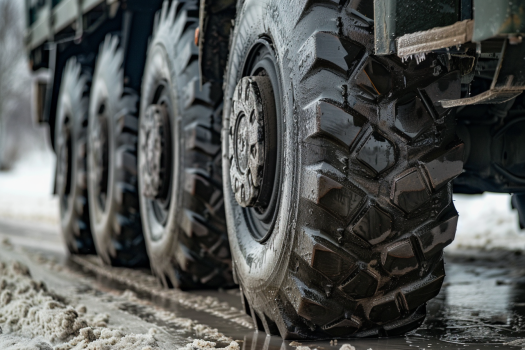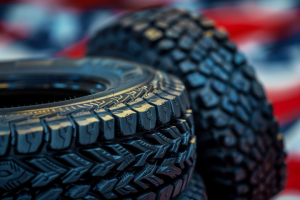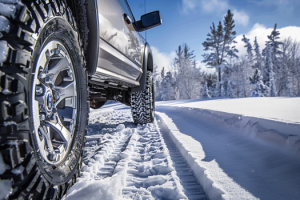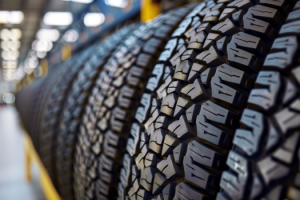Last Updated on May 24, 2024
Introduction to puncture-proof tires for your truck
Tire dependability is essential to trucking and heavy transportation operations because it promotes safety and efficiency. Introducing tires resistant to punctures significantly advances this field, providing increased toughness and resistance against typical road dangers. This essay explores the need for trustworthy truck tires and the hazards that come with tire punctures.

The Importance of Reliable Tires for Trucks
Trucks, known for their crucial role in logistics and transportation, require tires that can withstand heavy loads and long-distance travel under varying road conditions. The importance of reliable tires for trucks cannot be overstated for several key reasons:
- Safety: Safety is the primary concern when it comes to transportation. The only point of contact between the truck and the road is through the tires. Better handling and grip are ensured by reliable tires, which dramatically lowers the possibility of tire failure-related incidents.
- Load-Carrying Capacity: Trucks are built to tow large, heavy cargo. The tires must be strong enough to sustain this weight without sacrificing performance or safety.
- Fuel Efficiency: Reliable, well-maintained tires help reduce fuel use. Properly inflated and treaded tires minimize rolling resistance, hence lowering fuel consumption.
- Operational Costs: Replacing tires and fixing them because of wear and tear or punctures often raise operating costs. Long-lasting, puncture-proof tires drastically lower these expenses.
- Reducing Downtime: Tire-related problems sometimes cause unplanned stops and delays. Dependable tires reduce downtime, increasing operational efficiency.
Understanding Tire Puncture Risks
Tire punctures pose a significant risk to trucks, primarily due to:
- Road Debris: Nails, metal shards, and other sharp objects often found on roads can easily puncture tires. Trucks traveling on construction sites or less maintained roads are particularly vulnerable.
- Wear and Tear: Over time, tires wear down, making them more susceptible to punctures. Incorrect tire pressure and alignment exacerbate this issue.
- Environmental Factors: Extreme temperatures and rough terrain can also increase the risk of tire punctures.
Puncture-proof tires represent a vital innovation in truck tire technology. They prevent punctures and enhance truck operations’ safety, efficiency, and cost-effectiveness. As we progress in this series, we will explore the science behind these tires, how to select the right ones for your truck, and much more, ensuring that your journey on the road is as safe and efficient as possible.
The Science Behind Puncture-Proof Tires
Puncture-proof tires represent a remarkable fusion of material science and engineering. They are designed to withstand the rigors of the road without succumbing to common puncture risks. This section delves into the materials and design elements that make a tire puncture-proof and the technological advancements enhancing tire durability.
Materials and Design: What Makes a Tire Puncture-Proof?
The key to creating puncture-proof tires lies in the selection of materials and specific design features:
- Advanced Rubber Compounds: Modern puncture-proof tires are made from advanced rubber compounds that are more resistant to cuts, tears, and punctures. These compounds often include synthetic rubber mixed with natural rubber, providing a balance of flexibility, strength, and durability.
- Reinforced Sidewalls: The sidewalls in puncture-proof tires are reinforced with more rigid materials such as Kevlar or other aramid fibers. This reinforcement adds an extra layer of protection against sidewall damage, a common issue in standard tires.
- Multi-Layer Tread Design: The tread area in puncture-proof tires typically consists of multiple layers of rubber and fabric-like materials, creating a barrier that is difficult for sharp objects to penetrate.
- Self-Sealing Technology: Some puncture-proof tires incorporate a self-sealing layer within the tire. This layer is made of a special sealant that immediately seals small punctures or cuts, preventing air loss.
- Run-Flat Technology: Run-flat tires are a type of puncture-proof tire designed to maintain their shape and support the vehicle’s weight even after losing air pressure. This technology allows drivers to continue driving to a safe location for tire repair or replacement.
Technological Advancements in Tire Durability
The evolution of tire technology has seen numerous advancements aimed at increasing durability:
- Better Tread Patterns: Creative tread designs distribute wear and stress equally across the tire’s surface to increase tire life.
- Nanotechnology In Rubber: Incorporating nano-scale elements into rubber compounds has enhanced tire wear resistance and grip, augmenting overall durability.
- Airless Tires: Non-pneumatic, or airless, tires are a technological advance in the tire industry. These tires are immune to punctures because they are made of solid materials and don’t need air to keep their shape.
- Innovative tire technologies: By adding sensors and intelligent features to tires, tire conditions, such as tread wear and pressure, can be monitored in real time, which helps with preventive maintenance.
- Eco-Friendly Materials: Research into environmentally sustainable materials has also contributed to durability. These materials are more wear-resistant and reduce the environmental impact of tire production and disposal.
Evaluating Your Truck’s Tire Needs
Knowing and assessing the unique tire requirements of their truck is essential for any truck driver, whether they operate a business or a personal one. Vehicle performance, safety, and efficiency depend heavily on the tires, which are more than simply accessories. Choosing tires with the appropriate size and load rating is crucial, and this chapter focuses on determining tire requirements depending on vehicle usage.
Assessing Tire Requirements Based on Truck Usage
Truck usage varies widely, from long-haul transportation to local deliveries of off-road construction work to urban utility services. Each usage type demands specific tire characteristics:
- Long-haul Vehicles: The primary considerations for long-distance transit vehicles are tread life and fuel efficiency. The best tires have low rolling resistance and excellent durability.
- Regional Hauling: Regional trucks used for regional hauling and delivery need tires that can withstand repeated starts, pauses, and turns. The tread pattern requires greater attention for these applications.
- Construction and Off-Road Trucks: Off-road tires must be sturdy, with deep treads and sturdy sidewalls, to endure rugged terrain and avoid punctures.
- Urban Utility Trucks: When choosing tires for urban use, balance durability, and maneuverability, emphasizing resistance to frequent braking and acceleration.
Importance of the Right Tire Size and Load Rating
Selecting the correct tire size and load rating is not just a recommendation but a necessity:
- Tire Size: The size of a truck’s tires impacts its handling, load capacity, and fuel efficiency. Choosing the wrong size might reduce performance, safety risks, and wear and tear. When weighing different tire sizes, following the manufacturer’s recommendations or speaking with a tire expert is critical.
- Load Rating: A tire’s load rating tells you how much weight it can safely support at its utmost. This is especially important for trucks because they are frequently used to transport large loads. There are significant safety issues when tires fail due to an incorrect load rating. Truck drivers must comprehend the gross vehicle weight rating (GVWR) and verify that their tires meet or surpass this value.
Top Puncture-Proof Tire Brands for Trucks
In trucking, where every mile counts, having reliable, puncture-proof tires is essential. This article focuses on the leading brands known for their tire durability and compares their top models. This is a critical consideration for anyone in the market for truck tires that offer both longevity and safety.
Leading Brands in Tire Durability
Several brands stand out in the tire industry for their commitment to durability, especially when manufacturing puncture-proof tires for trucks. Here are some of the top contenders:
- Firestone: Firestone Tire was born in Akron, Ohio, and has been making quality tires for over 100 years. Their commercial truck tires offer all position, drive, steer, and trailer tires for long haul and regional applications. Firestone builds on/off-the-road, bus, wide-base, and agriculture tires. Firestone’s quality and dependability show in their long-lasting, fuel-efficient tires, which allow drivers to travel comfortably and confidently.
- Goodyear: Another industry leader, Goodyear, has a reputation for producing robust truck tires. Their models often feature advanced materials and designs that enhance puncture resistance and overall tire life.
- Bridgestone: Bridgestone is renowned for its commitment to quality and durability. Their truck tires are designed to withstand harsh conditions while providing reliable performance.
- Continental: With a focus on safety and performance, Continental’s truck tires are known for their durable construction and innovative tread designs that promote longevity.
- Pirelli: Although more famous for high-performance car tires, Pirelli also offers truck tires that are durable and reliable, with advanced features that prevent punctures and wear.
These brands have established themselves as leaders in the market by consistently delivering products that meet the rigorous demands of trucking.
Comparative Analysis of Top Models
When comparing top models from these brands, several factors come into play:
- Tread Life and Wear: Bridgestone and Michelin tires often perform well in tread life tests, providing a more significant number of kilometers before needing to be replaced.
- Puncture Resistance: Truck tires that drive on bumpy or debris-filled roads are best suited for Goodyear and Continental tires due to their remarkable puncture resistance features.
- Fuel Economy: Michelin tires are known for having low rolling resistance, which results in increased fuel economy.
- Price and Value: Although Pirelli and Continental tires may be more expensive, they frequently provide value in performance and durability.
- Load Capacity and Stability: Bridgestone and Goodyear tires are frequently chosen for heavy-duty trucks because they can bear loads steadily and comfortably.
Maintenance Tips for Puncture-Proof Tires
Even though puncture-proof tires are made to be more resilient to road hazards and longer-lasting, they must be maintained regularly to be functional. This segment of our comprehensive guide on truck tires focuses on the essential maintenance tips that can extend the life of puncture-proof tires and highlights the importance of detecting and addressing tire wear.
Regular Maintenance for Extended Tire Life
Regular maintenance is crucial to maximizing the life of puncture-proof tires. Here are some critical steps:
- Appropriate tire Inflation: Ensure your tires are consistently inflated to the recommended level. Underinflated tires can lead to irregular wear, worse fuel economy, and poor handling. Conversely, overinflated tires are more vulnerable to harm from flying dirt.
- Frequent Rotation: Rotating tires at intervals advised by the manufacturer ensures even wear. This procedure can significantly increase your tires’ lifespan.
- Alignment Verifications: Make sure your truck’s wheel alignment is inspected regularly. In addition to causing uneven tire wear, misalignment may impair the efficiency of puncture-proof systems.
- Tire Balancing: Properly balanced tires lessen the strain on the steering and suspension parts. Misaligned tires might result in vibration, early tire wear, and other mechanical problems.
- Check for Damage: Even if your tires are puncture-proof, you should regularly inspect them for damage, such as cuts, bulges, or embedded items. If these problems are identified early on, more serious ones can be avoided.
Detecting and Addressing Tire Wear
Tire care requires the identification and correction of tire wear. This is what to watch out for and how to deal with it:
- Footwear: Regularly check the tread depth. The legal minimum tread depth is one-sixth of an inch. Use a tread depth gauge to measure it. Unequal tread wear may be a sign of suspension or alignment problems.
- Verification of Sidewalls: Check for any cuts, cracks, or bulges on the sidewalls. Even in tires that withstand punctures, sidewall damage can weaken the tire’s structural integrity.
- Age of Tires: Be aware of the age of your tires. Even if they appear in good condition, rubber degrades over time, and it is recommended that you replace tires every 6-10 years.
- Vibration or Handling Issues: Check your tires if you notice unusual vibrations or handling issues. These could be signs of internal tire damage or a need for balancing.
Installation and Safety Considerations
The steps involved in fitting puncture-proof tires on a vehicle are aligning the tires with the wheels, ensuring the tire is safe, and optimizing its performance. For readers of the “Tires Easy Truck” website, this article discusses the pros and cons of DIY and professional installation and offers handling safety advice for puncture-proof tires.
Professional Installation vs. DIY
There is a debate about truck tire installation, but it may be settled by taking into account a few important factors:
- Expertise and Tools: Professional tire installers have the knowledge and tools to mount and balance tires correctly. This is especially crucial for heavy-duty truck tires, whose installation may require advanced tools.
- Time and Convenience: Although do-it-yourself installations appear less expensive, they can be labor-intensive and require a substantial investment in the necessary equipment. Professional installation, however, saves time and provides convenience.
- Safety: This is an important consideration. Tire installation errors might result in collisions. Experts make sure the tires are mounted, balanced, and securely fastened.
Given these considerations, while DIY installations might be suitable for those with the right skills and tools, professional installation is generally recommended for truck tires, especially puncture-proof ones.
Safety Tips When Handling Puncture-Proof Tires
Handling and maintaining puncture-proof tires requires adherence to safety protocols:
- Proper Lifting Techniques: Always use proper lifting techniques when handling heavy truck tires to prevent back injuries. Use tire handling equipment where available.
- Inspection Before Installation: Inspect the tires for any defects or damages before installation. Even puncture-proof tires can be compromised if they have manufacturing defects or have been damaged during shipping.
- Correct Tire Pressure: Always inflate tires to the manufacturer’s recommended pressure levels. Over- or under-inflation can affect the tire’s performance and longevity.
- Use of Safety Gear: When handling and installing tires, wear appropriate safety gear, including gloves and safety glasses.
- Awareness of Surroundings: Be aware of your surroundings, especially when working in a busy environment like a garage or a fleet yard.
- Disposal of Old Tires: Properly dispose of or recycle old tires. Incorrect disposal can pose environmental and safety risks.
Cost-Benefit Analysis of Puncture-Proof Tires
The proper tire selection can significantly impact performance and operational costs in the trucking business, where efficiency and safety are top priorities. Puncture-proof tires can save significant money over time, although they typically cost more upfront. This study conducts an in-depth cost-benefit analysis of puncture-proof tires, which balances budget and quality while emphasizing the initial cost against long-term savings.
Initial Investment vs. Long-Term Savings
When considering puncture-proof tires, it’s essential to weigh the initial cost against the potential long-term financial benefits:
- More significant Upfront Cost: Because of their sophisticated design and materials, puncture-proof tires usually cost more upfront than regular tires. This more significant initial cost can be a major consignificantation, particularly for fleets needing many sets of tires.
- Decreased Maintenance and Downtime: The durability of puncture-proof tires leads to fewer replacements and repairs, which is one of their biggest benefits. Because time is money in the commercial trucking industry, this minimizes downtime caused by tire problems.
- Extended tire Life: Pneumatic tires are built to last longer than regular tires because of their resilience. With time, this whole life can balance out the higher initial expenses.
- Safety and Liability Considerations: Puncture-proof tires’ dependability can also lessen the possibility of tire failure-related accidents, which may reduce liability risks and insurance costs.
Balancing Quality and Budget
Finding the right balance between quality and budget is important when investing in puncture-proof tires:
- Evaluating Needs vs. Cost: You must determine the particular requirements for your fleet or truck. Trucks that operate in less dangerous situations may not benefit as much from puncture-proof tires as those that travel over rugged terrain or in places where road debris is a common occurrence.
- Long-Term View: Consider the operational costs over the long haul, including possible savings on fuel, upkeep, and replacements. This angle may provide a more realistic depiction of the overall financial impact.
- Quality as a Financial Investment: Purchasing premium puncture-proof tires is like investing in the truck’s longevity and performance. Over time, higher-quality tires may save money due to their improved performance and safety features.
- Comparative Shopping: Research and compare different brands and models. Some may offer the benefits of puncture-proof technology at a more affordable price point, striking a balance between quality and budget.
User Experiences and Testimonials
When considering making the move, getting advice from people who have used puncture-proof truck tires is helpful. This section sheds light on the usefulness and effectiveness of these specialized tires by examining firsthand accounts from truck drivers who have used puncture-proof tires and comments and evaluations from professionals in the field.
Real-Life Stories from Truck Drivers
Truck drivers are the backbone of the logistics industry, and their experiences with puncture-proof tires can provide valuable insights. Here are some real-life stories:
- Enhanced Confidence on Uneven Terrain: Many truck drivers report feeling more secure in unpaved areas when using tires resistant to punctures. They can concentrate on the road and the goods because there is a lower chance of blowouts and flats.
- Decreased Downtime: Puncture-proof tires decrease downtime and increase productivity by saving drivers from the hassle of changing tires on the side of the road. This is vital for long-haul truck drivers, especially.
- Cost Reductions: Some drivers have reported significant tire maintenance and replacement cost reductions. The longer lifespan of puncture-proof tires benefits their bottom line.
- Improved Safety: A truck driver’s top priority is safety. Tires with puncture resistance have reduced the likelihood of incidents involving tires, giving consumers peace of mind.
Feedback and Ratings from Industry Experts
Industry experts and organizations also play an essential role in checking the performance of puncture-proof tires:
- Positive Reviews: Industry professionals frequently give positive reviews of puncture-proof tires for performance, safety, and durability. Numerous tests and analyses served as the foundation for these rankings.
- Diminished Environmental Impact: Certain specialists highlight the environmental advantages of puncture-proof tires, including less tire waste from fewer replacements and increased fuel economy.
- Regulation Compliance: Industry experts give positive reviews for puncture-proof tires that adhere to industry norms and regulations. Compliance guarantees that these tires are safe and appropriate for commercial use.
- Fuel Efficiency: Professionals can test puncture-proof tires’ fuel efficiency by contrasting them with regular tires. Higher ratings indicate successful fuel savings.
Future of Truck Tires: Innovations on the Horizon
Truck tires are about to undergo significant technological advancement due to the demand for more robust, efficient, and puncture-proof solutions. This article examines the developments in tire technology and provides an outlook on the future of puncture-proof tires related to truck tires.
Upcoming Trends in Tire Technology
The tire industry is constantly evolving, with several trends shaping the future of truck tires:
- Innovative tires: Sensor-equipped smart tire technology is becoming increasingly prevalent. These sensors can track real-time tread wear, temperature, and tire pressure. This information can be sent to fleet management or the driver, allowing for preventative maintenance and lowering the possibility of tire-related problems.
- Sustainable Materials: Environmental sustainability is a developing issue. Tire producers are investigating novel materials such as biodegradable compounds and sustainable rubber to lessen the environmental impact of tire disposal and production.
- 3D Printing: Tire Printing is being transformed by 3D printing. It prints complex tire designs and enhanced tread patterns for increased performance and traction. Moreover, customization to meet specific trucking requirements is an option.
- Airless Tires: Off-road applications are seeing a rise in the use of airless tire technology. Because these tires don’t rely on air pressure, there is no chance of blowouts or punctures. They also lessen the requirement for tire upkeep.
- Enhancements in Fuel Economy: Tire producers are creating low-rolling-resistance tires that improve fuel economy, emphasizing cutting fuel usage. This trend is crucial for cost-conscious trucking companies.
What’s Next for Puncture-Proof Tires?
Puncture-proof tires are expected to continue evolving in the following ways:
- Enhanced Durability: Future puncture-proof tires will probably use more robust materials and construction, lowering the possibility of cuts and punctures.
- Better Puncture-Proof Technologies: tires that can patch small punctures on the fly could be produced, increasing their lifespan.
- Integration with Smart Tire Technology: Smart tire sensors can be added to puncture-proof tires for real-time monitoring, enhancing tire safety and health management.
- Adaptability to Different Terrains: Tire manufacturers may create puncture-proof tires for a terrain. Examples of these types of tires are robust off-road tires and urban-use models.
- Personalization: The availability of puncture-proof tire customization choices could increase, allowing truck drivers to select the tires that best meet their requirements.
Conclusion & Recommendation
In our in-depth guide on puncture-proof truck tires, we’ve covered a lot of ground, including their significance, how to recognize the risks associated with tire punctures, the science underlying their construction, how to assess the tires you need for your vehicle, and the best brands of puncture-proof tires. In addition, we’ve covered user experiences, installation considerations, maintenance advice, and the future of truck tires. The main ideas are outlined in this last section, which also offers crucial advice for truck owners.
Summary of Key Points
Throughout this guide, we’ve highlighted several key points:
- Puncture-proof tires are crucial for truck owners, offering enhanced safety, durability, and cost savings.
- Understanding tire puncture risks, maintenance, and proper tire evaluation is essential for making informed choices.
- Leading tire brands like Michelin, Goodyear, Bridgestone, Continental, and Pirelli offer reliable puncture-proof options.
- Regular maintenance, correct tire pressure, and inspections are critical for extending the life of puncture-proof tires.
- Professional installation is recommended for safety and effectiveness, but DIY is possible with the right skills and tools.
- User experiences emphasize increased confidence, reduced downtime, and cost savings with puncture-proof tires.
- Industry experts provide positive ratings and recognition for the performance of puncture-proof tires.
- The future of truck tires involves innovative technology, sustainable materials, 3D printing, reprinting, and improved fuel efficiency.
- Puncture-proof tires may offer enhanced durability, advanced repair technologies, thoughtful integration, terrain-specific options, and customization.
Final Recommendations for Truck Owners
Based on the information provided in this guide, here are our final recommendations for truck owners:
- Prioritize Safety: Invest in puncture-proof tires to enhance safety on the road. The reduced risk of flats and blowouts can prevent accidents and protect lives.
- Regular Maintenance: Proper maintenance is critical to maximizing tire lifespan and performance, regardless of tire type. Regularly check tire pressure, alignment, and tread wear.
- Consider Professional Installation: While DIY is possible, professional installation ensures correct fitting and safety. It may also preserve warranty coverage.
- Evaluate Your Truck’s Needs: Assess your truck’s usage and terrain to determine the most suitable puncture-proof tire type for your specific requirements.
- Explore Smart Technology: Monitor upcoming innovative tire technologies that can improve monitoring and maintenance.
- Choose Quality Brands: For puncture-proof tires known for quality and reliability, opt for reputable tire brands like Michelin, Goodyear, Bridgestone, Continental, or Pirelli.
- Stay Informed: Stay updated on tire innovations and industry trends to make informed decisions as the technology evolves.
Now, take the next step towards improving your truck’s performance, safety, and efficiency by exploring our selection of puncture-proof tires at Tires Easy Truck. Take advantage of the opportunity to equip your vehicle with the best puncture-proof tire technology. Upgrade your tires today for a smoother and safer journey on the road.
FAQs
Is there such a thing as puncture-proof tires?
While not completely immune to all punctures, puncture-proof tires are designed to resist common road hazards like nails and glass, making them highly resistant to punctures.
Are puncture-proof tires any good?
Yes, puncture-proof tires are excellent for their durability and safety benefits. They reduce the risk of flats and blowouts, enhancing performance and safety.
Which tire is less prone to puncture?
Puncture-resistant tires, also known as run-flat or puncture-proof tires, are less prone to punctures due to their reinforced construction and specialized materials.
Can you get puncture-proof car tires?
Puncture-proof car tires are available and provide similar benefits to truck tires. They are a valuable option for car owners seeking added safety and durability.
What is the leading cause of tire punctures?
The leading causes of tire punctures are sharp objects on the road, such as nails, screws, glass, and debris, which can penetrate the tire’s tread.
Is it safe to drive with a tire puncture?
Driving with a punctured tire is unsafe and can lead to further damage and loss of control. It’s advisable to pull over and address the issue promptly.
What happens when a tire is punctured?
When a tire is punctured, air begins to leak, causing a loss of tire pressure. Depending on the severity of the puncture, it may lead to a flat tire or blowout.
What are the four ways a tire can fail?
Tires can fail due to punctures or blowouts caused by over- or underinflation. This leads to tire damage and tread wear that reduces traction and control. Regular maintenance is essential to prevent these issues.















